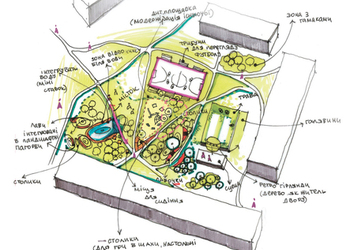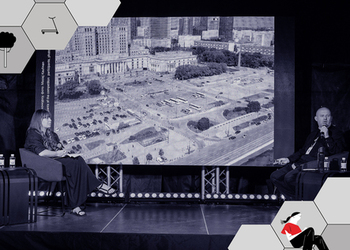When we talk about cities in the context of war, vulnerability and housing policy, the focus shouldn’t be only on the issue of housing provision, but also on how we can create inclusive, barrier-free home for different people. With the outbreak of a full-scale war, many people found themselves in a situation of new vulnerability that they may not have thought about before.
The discussion "Cities, War and Vulnerability" at the Ukrainian Urban Forum 2023 "Common House" addressed the additional challenges in Ukrainian society brought by the war, as well as key principles in policies that should be considered on the way to social justice. The discussion was moderated by Mariia Hryshchenko, sociologist and urban researcher.
Living in collective sites
Anastasiia Fitisova, Migration Researcher, Sociologist and Research Manager at REACH Initiative, outlined the main challenges and problems faced by internally displaced persons, in particular who live in collective sites. One of the important questions was to what extent are the spaces that were perceived as temporary solutions equipped for long-term living?
The category of internally displaced persons includes about five million people, and according to updated research, the vast majority, namely 80 %, are people who were forced to leave their homes a year ago. Recent surveys also indicate that, for example, in May, 3 % of these five million people were displaced within the last month. There are many of them who didn’t have a possibility to relocate after February 2022. They did not have savings or friends or relatives willing to receive them elsewhere, or there were other circumstances that made them stay in the frontline areas. It also refers to the forced evacuation of people from dangerous areas. These are often elderly people, persons with low mobility or disabilities and people with low income. Statistics of international humanitarian organisations reports that about 100,000 people live in collective sites. Many of them have hopes of returning home, but "temporary" spaces have become their home for a year or more.
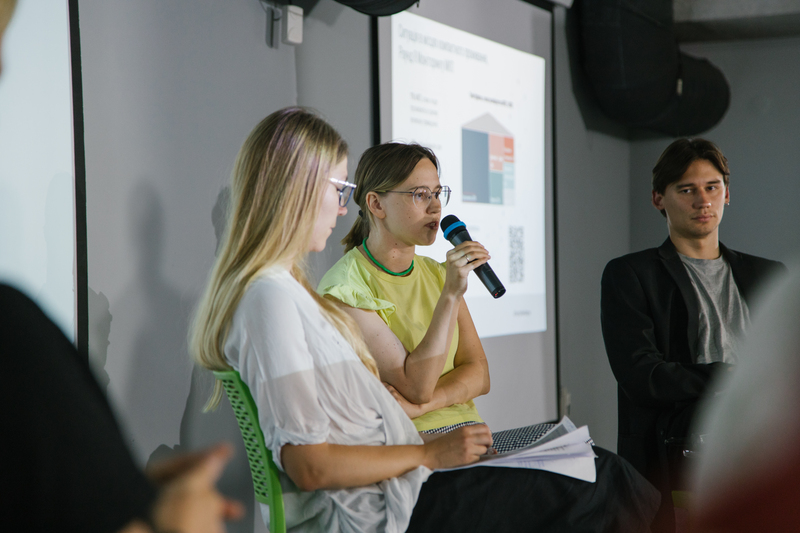
Since 2022 we, together with the REACH initiative, have been conducting research in collective sites. We are witnessing one big trend: many displaced people found a long-term solution, i.e. thanks to social connections they had an opportunity to rent housing, accommodate with their friends or acquaintances, find a daycare for their children, etc. However, if we talk again about collective sites, people who stayed there are often related to vulnerable categories. And let's not forget that these collective sites were created as spaces for temporary staying, but it is people with special needs who living there eventually for more than a year.
Collective sites are often premises related to educational institutions. These can be either university dormitories or gyms. Privacy is one of the key issues in these collective sites. Our updated surveys reported that 20 % of the people live in large premises such as a hall or gym. Half of the collective sites do not have separate rooms or spaces for one family. The privacy issue also refers to sanitary conveniences when there are no separating panels in toilets or showers. 87 % of respondents said that their collective sites do not have sanitary conveniences equipped for people with disabilities.
Obviously, significant change is required to find a affordable housing solution for many families - many more than there are now. For some, this may mean lowering rents, perhaps by increasing the quantity of housing in local authority stock. Perhaps local authorities should be more proactive and attract investment to replenish such housing stocks. Moreover, collective sites closing is required a long-term strategy so that people will not end up on the street.
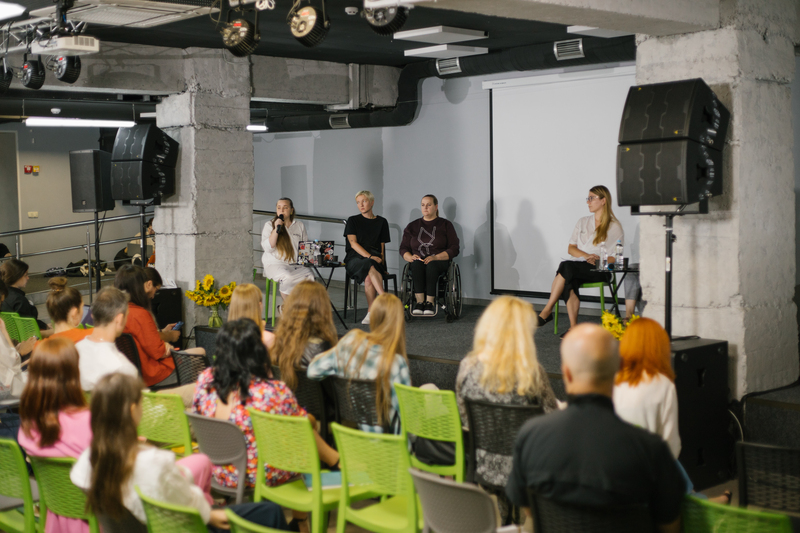
Adaptation of housing for persons with mobility impairments
NGO Harmonia supports persons with mobility impairments. Most of them are people who use wheelchairs or other mobility device. According to Lyudmyla Netskina, Chairman of the Board of NGO Harmonia, the problem of housing for people with disabilities was acute even before the full-scale invasion. As international experience shows, the main priority is to adapt housing to the needs of people with mobility impairments. However, in Ukraine, this issue faces several challenges. First of all, these are shortcomings in state policies and stigmatization of people with low mobility in society.
"If a person lived in a conventional Khrushchev-era apartment on the 5th floor and all of a sudden became disabled, the likelihood that they would be able to get into the courtyard of their apartment building at least a few times a year is very low. Unfortunately, our state forgets about such people. We have a system of benefits and guarantees, but it is very difficult to adapt housing to the needs of a person with a disability."
According to Netskina, their organisation often faces resistance from people themselves when it comes to changing their housing. People find it difficult to leave their homes in favour of renovations or other factors despite the undeniable advantages of accessible housing.
"People with disabilities often do not see their relevance in society. They don't understand that they can be full-fledged members of this society, that they have the opportunity to easily access employment, that they can take their children to daycare without hindrance. Unfortunately, with a full-scale war, the number of people with disabilities is growing every day, so it is necessary to continue working not only with laws but also with individuals. Moreover, society is often not ready to accept someone different. We had a story where a person bought a house and the residents all banded together to have the gas disconnected for her. They claimed that a person in a wheelchair will blow down the whole building. Such discriminatory beliefs should be addressed as well.
In the context of the war, there were stories where, in Kharkiv, for example, people in wheelchairs couldn't escape a building under shelling because the elevators weren't working. The same refers to shelters not designed for people with disabilities." For these people, the question of whether to go to a shelter is not even a personal choice.
The development of policies is required the involvement of different expert organizations working with each category of vulnerable people. For example, the accessibility of Vinnytsia city was achieved through the cooperation of the civil sector and local authorities. It is the community that drives certain issues”.
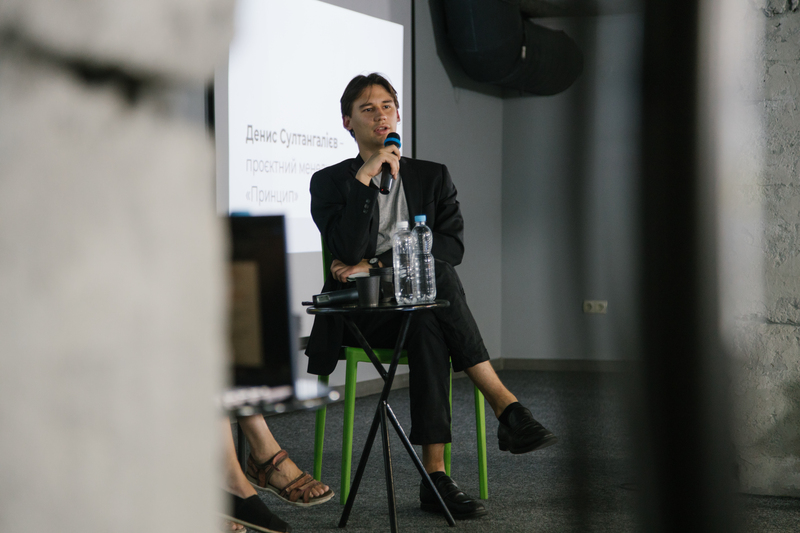
Social policy for veterans
Denys Sultanhaliiev, Project Manager at NGO Pryncyp spoke about how the full-scale war has affected the veteran community and how social policy for veterans should be shaped.
At present, the veteran community in Ukraine is mostly comprised of ATO (Anti-Terrorist Operation) veterans or veterans of the full-scale war who have been injured. However, a significant veteran community in the country has not yet formed as most individuals who went to war after February 2022 are still active-duty military personnel. Those who have been injured face an incredible amount of bureaucratic procedures before they can be recognized as veterans." After the war is over, this community will include at least half a million people - a large enough group to have an influential voice in Ukrainian political discourse, and to which we, as civilians, will have certain responsibilities.
The topic of veterans seems to exist between two major discussions: about Ukraine's defense capability and about social policy. It's evident that within this group, there are various subgroups with different vulnerabilities." Whether people have disabilities or not, or even less obvious examples like veterans originating from temporarily occupied territories. These are individuals who not only directly participated in hostilities but also lost their homes and social contacts.
The position of our human rights centre is that high-quality veteran and social policies for veterans can only be achieved through comprehensive research. And, as we mentioned earlier, we currently do not have the capacity to reach the entire social group and assess their needs, problems and challenges. It is important to try to research and communicate with even the small groups accessible for us.
If state institutions cannot conduct comprehensive research to develop policies, then the interaction with the civil sector is crucial where financial support can be obtained and a strong research team can be formed. At the same time the state has access to various registers and data that can be important for researchers. In addition, the social policy for veteran community should be based on problems and vulnerabilities of these individuals rather than on their military merits.
On the experience of people returning to their communities
Uliana Dzhurliak, architect, NEST project former coordinator of the humanitarian direction of Sergey Prytula Foundation, shared her experience of working with communities and emphasized the importance of people returning to their homes.
The NEST project, which our team members affectionately call "hnizdechko" (a little nest), operates in villages and small towns, providing temporary modular housing for people whose homes have been destroyed. Families can live there for 10 to 15 years until they rebuild their own homes. We work with 49 settlements where 585 families have completely lost their homes meaning they cannot be restored or repaired. At the same time, during this year, the state, i.e. under the responsibility of oblast military administrations, has rebuilt 10 houses there.
We work in Kyiv oblast where, as of August, nearly 70 % of people have decided to return to their homes. Many people simply don't know how to live in other city; they were eager to be at home — to return to their villages, to their neighbours, to restore their social connections and, together with everyone, to get back to work and recover their communities. Specifically, the Makariv region quickly began to restore its infrastructure and educational institutions. It was crucial to get people out of temporary accommodation, out of modular towns, where there are many problems.
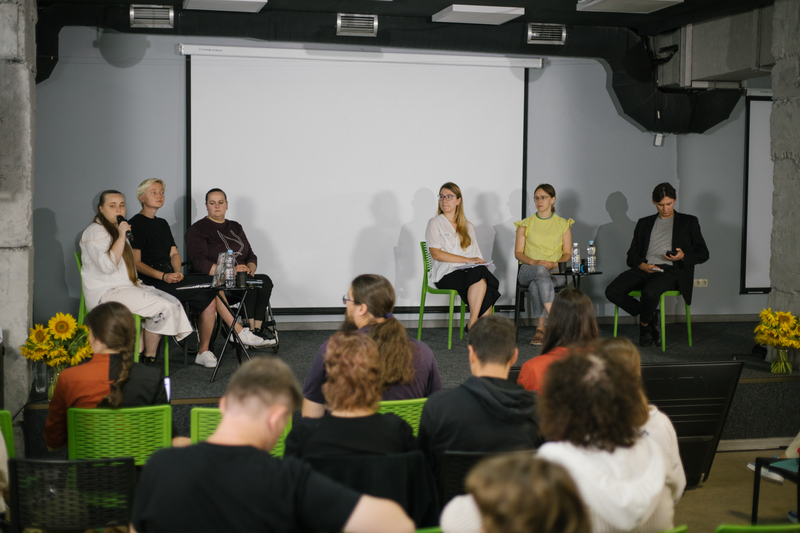
Now the state has initiated compensation payments for the destroyed housing. There are several Cabinet of Ministers' resolutions and they are all quite vague. There is no effective communication to help people understand the mechanism for receiving these compensations. For instance, there are charitable organizations that provide financial assistance but families do not fully understand how agreeing to such payments can impact state compensation. According to the law, it shouldn't, but this is inadequately communicated to the communities. Moreover, residents whose homes were destroyed were not involved in the formulation of the housing restoration protocol. These procedures, which go through special accounts and controlled payments formed by the state, do not take into account the real-life situations - that often these houses are rebuilt with the help of relatives and friends and that the needs can be diverse.”
The vulnerabilities that we do not notice
Starting from the first weeks of the war, analytical centre Cedos conducted research on how the war affects the population, economic conditions, housing issues, relationships among family members and with neighbours as well as ideas of the future. Together with the World Bank, the centre works on a large-scale research regarding the impact of war on various vulnerable groups. At the same time, Natalia Lomonosova, Senior Analyst at Cedos and Social Policy Coordinator, primarily focuses on the concept of vulnerability understanding and the need to destigmatize vulnerability.
“No one wants to be vulnerable. Over the past year we have cooperated extensively with veteran organizations. We often hear in our discussions that veterans do not want to be classified as vulnerable groups. Similarly, elderly people do not want to be included in vulnerable groups. A person has worked all his or her life as a teacher or a doctor, why should he or she feel vulnerable? Why label us as vulnerable?" Or people living in frontline communities might express during focus group discussions or interviews, "We're not vulnerable; we're normal people, why are we vulnerable?" This raises the question: what is vulnerability?
In Ukrainian legislation, vulnerability is defined as a high risk of falling into difficult life circumstances. They can be caused by two types of factors - internal and external. In simple words, internal factors are related to the fact that we are human. We have a body, it wears out, it can get sick, we can die. We are also animals that live collectively. We can lose people who are dear to us. We cannot live just under the open sky. If we lose our home, not only because of the war, but because of a flood, for example, it is unfortunately difficult to cope with it. In other words, there is a certain vulnerability that is inherent to all of us as human beings and there's nothing we can do about it. However, there are external factors, such as war or unemployment, that face both young and senior people.
External factors are things that are often addressable at the policy level. For example, we are talking about a person who has lost his or her home or his/her home has been damaged due to hostilities. Is this person vulnerable at this time? Does this person become vulnerable at the moment when he/she moves to the other city and face an unregulated rental market there? During our research we noticed that vulnerability arises when individuals interact with policymakers and society and it can indeed be effectively addressed. It's worth reconsidering how we perceive vulnerability.
General vulnerability and poverty related to social protections in Ukraine are some of the risks people face during times of war. We talk a lot about housing as a home - everyone has the right to a roof over their head. However, everyone living in Ukraine knows that an apartment or housing is also an investment, an asset. Many people now work as individual entrepreneurs or have even less secure employment relationships. In the context of lack of social guarantees and possible of no pensions, buying another housing is a way to secure your future. It is the only investment choice. However, ways to purchase housing, such as a loan, are not available to a large number of people - not because they are related to a vulnerable group called "elderly people" or "veterans" or "IDPs", but because they live in Ukraine where people are quite vulnerable in general. Many people who have lost their homes due to hostilities have never had experience of renting housing before and they have no savings. Elder people are often unable to solve this problem individually as they do not have resources for it.
A large number of vulnerable groups do not have political representation. For example, the needs of homeless people are not mentioned in Ukraine's Recovery Plan even once. In 2019 we conduct a research on housing conditions and the attitudes of Ukrainians towards housing policy. There was an interesting question - which categories of people housing policy should be primarily targeted? Only 9% of respondents chose the option "homeless people". It means that there are vulnerabilities that we do not notice.
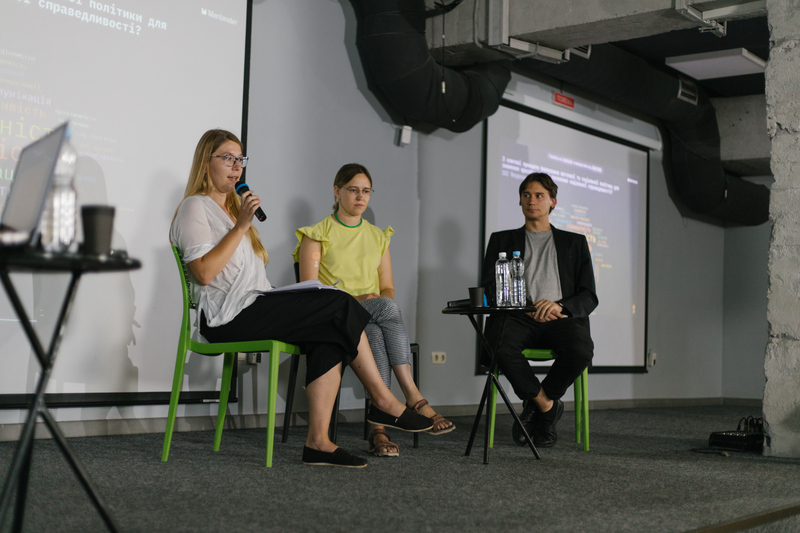
What would have to change in policies at the state and local levels?
It is important to address issues related to the financing of social and housing policies. There should be more focus on taxes, including increasing income tax, property tax and the unified social security contribution.
It is necessary to expand universal social policies as opposed to targeted policies. Everyone should have the opportunity to access assistance if they need housing.
We should consider about the integrated development of communities paying attention not only to housing but also to work and employment. Perhaps we need to talk not only about restoring or rebuilding housing, but also about investing in retraining people in cities where there are fewer problems with housing.
Whatever decisions are made in the short-term perspective, they should not exacerbate existing vulnerabilities and should not make people dependent on the social security system.

